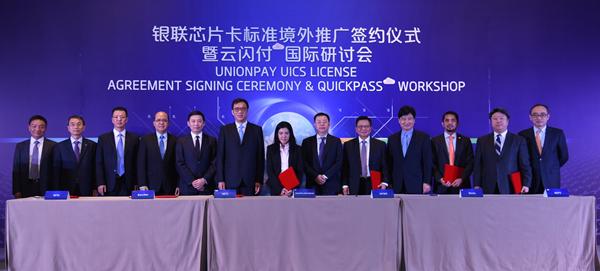
Fan Yifei (6th left), Party Committee Member and Vice President of the People’s Bank of China, Ge Huayong (4th right), Chairman of China UnionPay, and Shi Wenchao (1st left), President of China UnionPay attended the signing ceremony. Cai Jianbo (2nd right), CEO of UnionPay International and the representatives of partner institutions signed the agreement.
On October 12, UnionPay announced its chip card standard licensing cooperation with seven member institutions of Asian Payment Network (APN). This marks a new breakthrough in the “Going Global” of China’s financial technology standards. With this cooperation, the major switch networks in Singapore, Thailand, South Korea, Malaysia, Indonesia and the Philippines will adopt UnionPay chip card standard in card acceptance and card issuance.
Fan Yifei, Party Committee Member and Vice President of the People’s Bank of China, Ge Huayong, Chairman of China UnionPay, and Shi Wenchao, President of China UnionPay attended the signing ceremony. Representatives from partner institutions including Bank of China, Agricultural Bank of China, Industrial and Commercial Bank of China, China Construction Bank, China Travel Service (CTS), China International Travel Service (CITS), China Youth Travel Service (CYTS), Ctrip, Utour, CAISSA Touristic and Ministry of Foreign Affairs were present to witness. Cai Jianbo, CEO of UnionPay International and the representatives of partner institutions signed the agreement.
Now, UnionPay acceptance network has expanded to 160 countries and regions, and 40 countries and regions have issued UnionPay cards. While promoting cross-border businesses, UnionPay is also giving full play of its advantages in network, product, technology and standard to takes part in the construction of financial infrastructure in markets outside mainland China, so as to explore new expansion models and to accelerate the localization of its business. In Thailand, UnionPay chip card standard has become the industrial standard of local bank industry, and Thai Payment Network (TPN) jointly constructed by UnionPay International and major local banks has gone live. UnionPay also participated in the construction of Laos national bank card payment system.
According to Fan Yifei, China’s payment industry is expanding and growing rapidly, and is playing an increasingly significant role in promoting e-commerce, enhancing financial inclusion, meeting consumers’ diverse demands and fueling economic growth. APN members’ adoption of UnionPay chip card standard means that UnionPay’s technology and service have been recognized by the international market. The cooperation also helps promoting the upgrading of digital payment industry in these countries and regions. He requires that UnionPay and other institutions keep in good contact with these markets and offer sufficient services to ensure the successful landing of these projects. He also welcomes overseas counterparts’ suggestions and advices, and is willing to share opportunities with more partners.
Ge Huayong said, UnionPay has taken active part in the construction of financial infrastructure in many Asian countries since 2014. This agreement signing with APN members today will help realize the interconnection among payment networks in the Asia Pacific region, serve the financial exchanges between these countries and regions, and facilitate people in the region to make cross-border payments. It will also promote the expansion of chip card-based innovative payment products such as UnionPay mobile QuickPass in the region.
Composed of 13 switch networks in 11 Asia-Pacific countries, APN is aimed at promoting the interconnection among various payment networks in the region. In 2005, APN compared the chip card standards of several international bankcard brands through competitive bidding and finally chose UnionPay as the sole provider of its cross-border chip card standard. After this agreement signing, the members of APN will adopt UnionPay chip card standard for all the APN brand cards they issue. Besides providing technology and business standard, UnionPay will also provide training and other services, to promote the use and acceptance of UnionPay chip cards in Asia-Pacific.
This agreement signing is of great significance to all the players in the markets. First, it marks that the cooperation between UnionPay and payment industries outside mainland China has upgraded from business cooperation to comprehensive partnership in product and standard. Second, it helps promote the payment industries in these markets to upgrade from magnetic stripe cards to chip cards, and paves way for the roll-out of UnionPay contactless, mobile and wallet payment products in these markets. Third, UnionPay takes advantage of the implementation of the Belt and Road strategy to expand its clearing and settlement infrastructure and technology standard, which will help enhance the competitiveness of China’s payment industry.
Other APN members will sign authorization agreement with UnionPay in the future. The six participating institutions present today are: NITMX, Thailand’s National Interbank Transaction Management Exchange, NETS, the Network for Electronic Transfers Singapore Pte Ltd., Rintis, Indonesian ATM switch institution, BancNet, the Philippine-based interbank network, MEPS, Malaysia Electronic Payment System, and KFTC, Korea Financial Telecommunications and Clearings Institute.


 ATM Location
ATM Location
 Exchange Rate Query
Exchange Rate Query
 Featured offers
Featured offers

